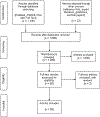An Adapted Conceptual Model Integrating Palliative Care in Serious Illness and Multiple Chronic Conditions
- PMID: 32508110
- PMCID: PMC7483852
- DOI: 10.1177/1049909120928353
An Adapted Conceptual Model Integrating Palliative Care in Serious Illness and Multiple Chronic Conditions
Abstract
Objective: Seriously ill adults with multiple chronic conditions (MCC) who receive palliative care may benefit from improved symptom burden, health care utilization and cost, caregiver stress, and quality of life. To guide research involving serious illness and MCC, palliative care can be integrated into a conceptual model to develop future research studies to improve care strategies and outcomes in this population.
Methods: The adapted conceptual model was developed based on a thorough review of the literature, in which current evidence and conceptual models related to serious illness, MCC, and palliative care were appraised. Factors contributing to patients' needs, services received, and service-related variables were identified. Relevant patient outcomes and evidence gaps are also highlighted.
Results: Fifty-eight articles were synthesized to inform the development of an adapted conceptual model including serious illness, MCC, and palliative care. Concepts were organized into 4 main conceptual groups, including Factors Affecting Needs (sociodemographic and social determinants of health), Factors Affecting Services Received (health system; research, evidence base, dissemination, and health policy; community resources), Service-Related Variables (patient visits, service mix, quality of care, patient information, experience), and Outcomes (symptom burden, quality of life, function, advance care planning, goal-concordant care, utilization, cost, death, site of death, satisfaction).
Discussion: The adapted conceptual model integrates palliative care with serious illness and multiple chronic conditions. The model is intended to guide the development of research studies involving seriously ill adults with MCC and aid researchers in addressing relevant evidence gaps.
Keywords: clinical complexity; conceptual model; multiple chronic conditions; palliative care; research; serious illness.
Figures




Similar articles
-
Latent Class Analysis of Symptom Burden Among Seriously Ill Adults at the End of Life.Nurs Res. 2021 Nov-Dec 01;70(6):443-454. doi: 10.1097/NNR.0000000000000549. Nurs Res. 2021. PMID: 34393192 Free PMC article.
-
Integrating Palliative Care into the Chronic Illness Continuum: a Conceptual Model for Minority Populations.J Racial Ethn Health Disparities. 2019 Dec;6(6):1078-1086. doi: 10.1007/s40615-019-00610-y. Epub 2019 Jun 27. J Racial Ethn Health Disparities. 2019. PMID: 31250371 Review.
-
Closing the quality gap: revisiting the state of the science (vol. 8: improving health care and palliative care for advanced and serious illness).Evid Rep Technol Assess (Full Rep). 2012 Oct;(208.8):1-249. Evid Rep Technol Assess (Full Rep). 2012. PMID: 24423021 Free PMC article.
-
Feasibility of a rural palliative supportive service.Rural Remote Health. 2015 Apr-Jun;15(2):3116. Epub 2015 May 4. Rural Remote Health. 2015. PMID: 25939666
-
The State of the Science on Integrating Palliative Care in Heart Failure.J Palliat Med. 2017 Jun;20(6):592-603. doi: 10.1089/jpm.2017.0178. Epub 2017 May 12. J Palliat Med. 2017. PMID: 29493362 Free PMC article. Review.
Cited by
-
Caregivers' Perspectives on Discussions of Medical Treatment Preferences for People Living With Dementia Are Associated With Their Dementia Health Literacy and the Caregiving Relationship.Gerontologist. 2025 Mar 25;65(4):gnaf033. doi: 10.1093/geront/gnaf033. Gerontologist. 2025. PMID: 39878947 Free PMC article.
-
Measuring Palliative Care-Related Knowledge, Attitudes, and Confidence in Home Health Care Clinicians, Patients, and Caregivers: A Systematic Review.J Palliat Med. 2022 Oct;25(10):1579-1598. doi: 10.1089/jpm.2021.0580. Epub 2022 Jun 14. J Palliat Med. 2022. PMID: 35704053 Free PMC article.
-
The burden of pre-admission pain, depression, and caregiving on palliative care needs for seriously ill trauma patients.J Am Geriatr Soc. 2023 Jul;71(7):2229-2238. doi: 10.1111/jgs.18289. Epub 2023 Feb 21. J Am Geriatr Soc. 2023. PMID: 36805543 Free PMC article.
-
Latent Class Analysis of Symptom Burden Among Seriously Ill Adults at the End of Life.Nurs Res. 2021 Nov-Dec 01;70(6):443-454. doi: 10.1097/NNR.0000000000000549. Nurs Res. 2021. PMID: 34393192 Free PMC article.
-
Lung Cancer and Palliative Care Support: The Role of Social Determinants of Health for Older Adult Patients.Oncol Nurs Forum. 2024 Dec 12;52(1):61-69. doi: 10.1188/25.ONF.61-69. Oncol Nurs Forum. 2024. PMID: 39933111 Free PMC article.
References
-
- National Quality Forum. Multiple chronic conditions measurement framework. Accessed Nov 10, 2019 https://www.qualityforum.org/Projects/Multiple_Chronic_Conditions_Measur.... Updated 2012.
-
- Boyd C, Smith CD, Masoudi FA, et al. Decision making for older adults with multiple chronic conditions: Executive summary for the american geriatrics society guiding principles on the care of older adults with multimorbidity. J Am Geriatr Soc. 2019;67(4):665–673. Accessed Nov 18, 2019. doi: 10.1111/jgs.15809. - DOI - PubMed
-
- Blaum CS, Rosen J, Naik AD, et al. Patient‐Centered care for older adults with multiple chronic conditions: A stepwise approach from the American Geriatrics Society. Journal of the American Geriatrics Society. 2012;60(10):1957–1968. https://onlinelibrary.wiley.com/doi/abs/10.1111/j.1532-5415.2012.04187.x. doi: 10.1111/j.1532-5415.2012.04187.x. - DOI - DOI - PMC - PubMed
-
- Kelley AS, Morrison RS, Wenger NS, Ettner SL, Sarkisian CA. Determinants of treatment intensity for patients with serious illness: A new conceptual framework. Journal of palliative medicine. 2010;13(7):807–813. https://www.ncbi.nlm.nih.gov/pubmed/20636149. doi: 10.1089/jpm.2010.0007. - DOI - PMC - PubMed
MeSH terms
Grants and funding
LinkOut - more resources
Full Text Sources
Medical

